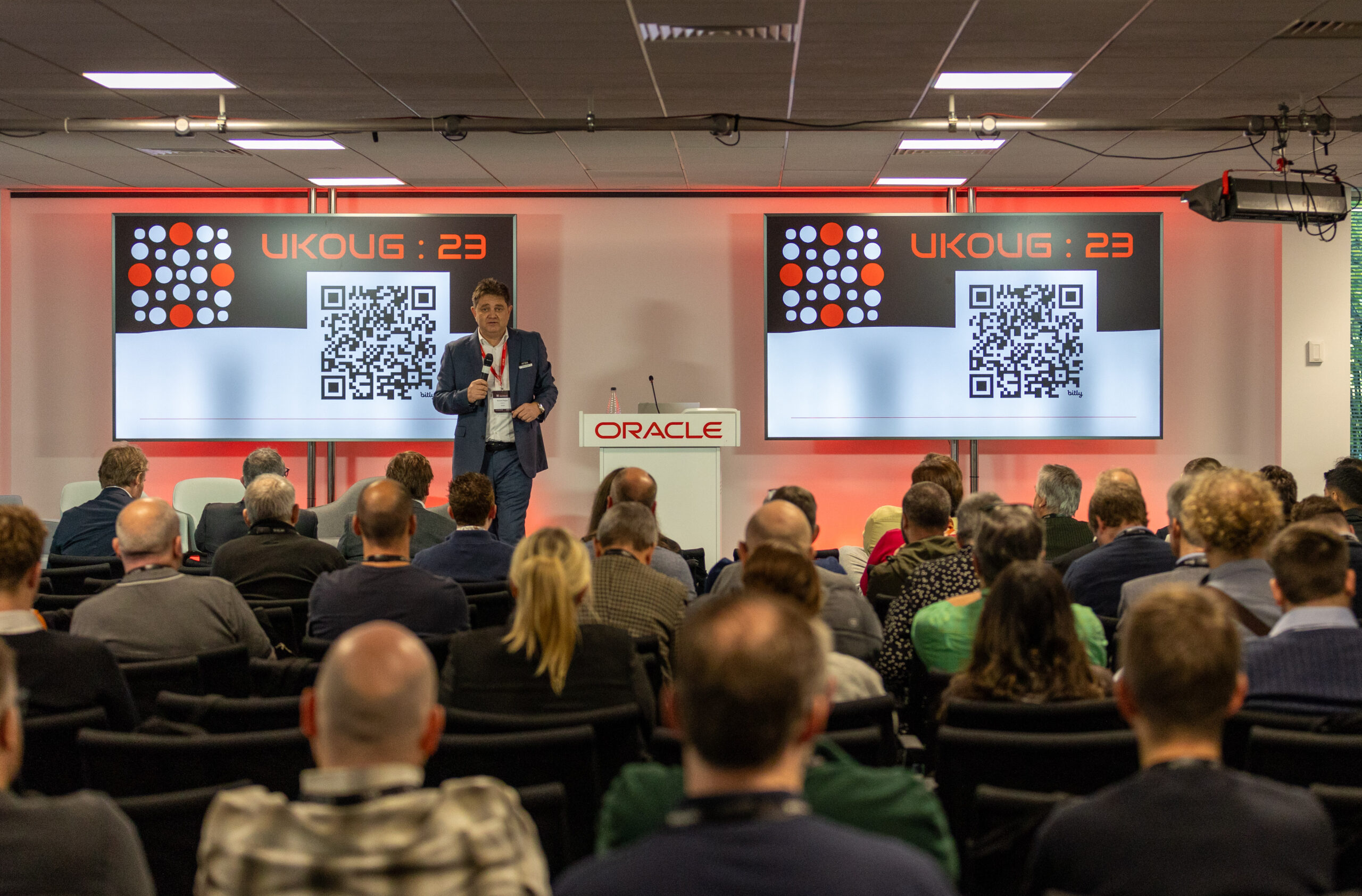The UKOUG 23 conference has taken place at Oracle’s Thames Valley site in Reading, with the independent user group celebrating 40 years of supporting Oracle users in the UK region.
The group has praised Oracle’s work to ‘freshen up’ its reputation as a hard-line, product-led vendor, as Big Red continues to soften its approach to customer service, reacting to the rise of SaaS delivery requirements.
Welcoming over 100 businesses to the event, UKOUG president, Richard Pepper, and member advocate for applications, James Herbert, kicked off the day one keynote and invited Oracle’s UK country leader, Siobhan Wilson, Nick Wallace, UK head of Oracle cloud sales, and Kelly Pierce, senior director for strategy and transformation for healthcare at Oracle, to the stage for a discussion panel.
Wilson, commenting on the aftermath of Oracle Cloud World, said on the panel: “We’re now looking at how we can help our customers much more. We were selling products, we’re now selling an experience. We’re reorientating our company to be a customer-first organization – because of the move to the cloud, we’re not selling a product, we’re selling a service.”

Pierce added, “Definitely from a public sector and healthcare experience that’s really, really important. It’s to walk in people’s shoes and to really inject empathy into what you’re doing and I know we’re mirroring that across all our industries.”
For Pierce, Oracle’s ongoing work with Cerner post-acquisition is feeding into this mission: “It’s coming to that detail that’s so important to put back into healthcare and it massively excites me. This is our time to do it. The acquisition really does mean we can try to cut out so much administration of clinical staff and give that back to patient care.”
What the user group thinks
Oracle paints a rosy picture and it’s one definitely welcomed by UKOUG, though the group admits there is still work to do. Catching up with Pepper and Herbert, they share that, for the user group, it’s a great step in the right direction, with ongoing Oracle and independent customer support needed to ensure successful implementation journeys to the cloud. Also expressed was the need for additional ongoing support for users remaining on or transitioning from on-premises software, highlighting that ongoing requirement for an easier cloud transition.
“Oracle was famous for being a very tech-heavy company, all about databases. But now implementing the SaaS model has meant that it’s about adoption. It’s about best practice and that needs an approach of change management, transformation and changing how the businesses works.

You change how a business works with people, who talk to other friendly informed people that are senior influences, the CIOs and the CFOs in organizations,” said Pepper.
“There are now 14,000 customers on Oracle Cloud, it’s very successful. Every company will eventually go to the cloud. The product is very good, but it’s the journey of that product where things can start to fail. You’re always going to get a couple that don’t go right.”
Herbert is clear that the journey to ongoing digital development still isn’t always easy: “An awful lot of Oracle Application customers are sitting on the old generation or absent limited product sets. They’re all going to go on this journey, some folks have been on it already – they’re the ones that maybe have the glint in the eye, or that thousand-yard stare look. But it’s sharing that experience, having that independent experience, which gives other organizations the confidence.”

Across the two days, the user group hosted talks across the Oracle campus, with Herbert sharing: “The rooms are full where the end users are telling their stories. It’s got its ups and downs, it’s a rollercoaster. The part of the user group is to tell you what the ups and downs are, because Oracle won’t, for Oracle, everything is awesome. We’ve got people who have been there, done that and got the T-shirts and so can say, this is what works, this is what didn’t and here’s what we learned.”
Voicing customer feedback, Pepper also shared the need for a greater number of ‘real-life’ examples of GenAI use cases from Oracle, as well as greater flexibility in user licensing models to help with the large price tag associated with the software, especially in a SaaS and ongoing maintenance framework.
For Ciara Banerji, director at Liston Ferry Partnership, a consultancy dealing with defense and manufacturing sector clients for both Oracle and SAP, there is ongoing uncertainty and the need to get customers “over that trust journey to the cloud”.

“For their desire to move to the cloud, there is a lot of resistance at the moment and concern over how secure the data is,” explained Banerji. “Everyone feels and knows where it’s heading, but how do you get comfortable around that? There are a lot of legal reasons why companies want to keep their systems on the ground at the moment. The big programs are also complicated and there is a distrust – there’s been a lot of failure in delivering these programs over the past number of years.”
For Oracle, partnerships like the recent Oracle Database@Azure announcement with Microsoft are hoping to make things easier for users moving forward.
“Until recently, it was very difficult,” said Pepper. “And now it just allows businesses to have that freedom to say we don’t need to replace everything, because it can now exist together with the platforms working together.”
Wallace, speaking on the Oracle Database@Azure announcement, said: “When I was at Microsoft very few Oracle workloads were moving to Azure, for mostly performance reasons, and no one moved from Oracle SQL – it just didn’t happen. So, this is a signal that Microsoft recognizes the huge importance for enterprise customers on that mission-critical data. That’s a recognition that they need Oracle.
“There are probably five to seven very large, top enterprise customers that we’re currently working with on this at the moment, with private preview starting next year and general availability in the middle of next year. I think the customers generally with benefit a lot from it.”
A fresh face and a fresh generation
Oracle’s GenO career program was also praised at UKOUG 23, growing from 200 GenO members in the cohort across EMEA two and a half years ago, to onboard greater numbers of STEM entrants to Oracle, to now over doubling in size, seeing 4-500 starters in this year alone for EMEA, cross-pillar, and expanding to 40+ EMEA countries.
At a talk given at the event, Chloe Fox, founder of Veritas Digital Marketing expressed the importance of GenO and other such programs for encouraging more entrants into STEM.

“It goes to show that by reframing how we think about STEM, and through that, changing how we talk about STEM, we are allowing people to see that there is a place for them there. It’s our responsibility as people in STEM to make sure we’re creating an accurate vision of what STEM is for the next generation.”
Fox explained that with GenO, and by shifting the narrative about a precoded type of person entering STEM, we can answer the labor gap in the market and welcome a greater scope of minds into the industry.
Sharing their backgrounds, some GenO employees revealed sales, politics and international relations, psychology and HR, classics and ancient history education – all avenues that are being welcomed into the talent pool for the next generation of STEM experts.
A trickle-down takeaway
The takeaway from UKOUG? Oracle is continuing a greater focus on people and its customers in this as-a-service era, with its hard-line tech focus now taking a softer approach. It’s a rebrand that has not gone unnoticed or unappreciated by its customers but, for the average Oracle user, the trickle-down results of this transformation are still in progress.




